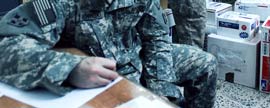Before I begin, automatic integration is covered in AR 600-8-19 paragraph 3-17. With regard to varying standards, I would ask you to look over AR 623-3 and review the first chapter. It specifically states that the Army changes policy and procedures to meet the changing needs in war and in peace.
See AR 623-3 paragraph 1-8
(3) The ERS combines major elements of counseling, assessment, documentation, and integration with other personnel functions to meet the needs of the Army, rating officials, and rated Soldiers in their current environments. Its basic foundation—to evaluate today’s Soldiers to select and develop tomorrow’s leaders—will remain consistent.
(a) Rating officials assess a Soldier’s performance and potential against standards—the Army Values, the Army’s leadership doctrine framework, the organization’s mission, and a particular set of duties, responsibilities, tasks, and objectives using a series of box checks, narratives, bullet comments, and evaluation report rating techniques. The intent of the ERS should be to drive rated Soldiers to meet or exceed the standards. While standards or techniques may change, the ERS will continue to be the most accurate and effective assessment tool and development system possible. It will accomplish its mission of developing people and leaders.
I reference this to explain that the Army’s needs change, as does its mission. Therefore they will implement methods to achieve the goals for the overall Army – whether we as individuals agree with them or not.
I would invite you to look at the issue a little differently. Standards are ever changing, not only within the Army, but during life itself (Civilian, Military, Education, etc). The Army saw a need and required a way to fill it. For example: the Army requires a score of 180 on an APFT. Anything above that is gravy. Everyone still gets a go as long as they achieve 60 points in each area. However basic training Soldi3ers currently do not have to meet these standards. They can graduate basic with a score less than 180 point. You may view these individuals as substandard Soldiers. Keep in mind substandard performers rarely promote themselves. They are usually promoted by leaders who failed to do their jobs. I believe your frustration is misplaced and more importantly may end up getting you in trouble!
It is also important to understand another underlying reason for the automated integration list. Army leaders at the company and battalion level (SFC-CSM, 1LT-CPT) failed to properly address the issue. For years there were numerous Specialists and Sergeants that were fully eligible for promotion and were not attending promotion boards. These Soldier were not being counseled or recommended for promotion. Senior Army leadership (SMA, Corps/DIV CSM and their respective commanders) worked aggressively to try and reduce the number of the Soldiers that were fully eligible but not attending promotion boards. They did not want to promote substandard performers. They wanted substandard performers to be counseled so that they could either improve or be eliminated from the service. Senior Army Leadership also wanted Soldiers that met the standard to attend promotion boards. After years of attempting to reduce this pool of qualified individuals with little success the demanded to fill valid leadership position required the Army to modify policy and implement the automated list integration. This policy then required unit leadership to take action to prevent substandard performers from being promoted.
I would also encourage you to look at this from another perspective. Should you fail to treat these Soldiers as equals, fail to encourage respect for superiors, and/or fail to treat these Soldiers with respect and dignity, you are not only degrading Army values, but actually degrading the people and their position. Your actions then become counter to the good order and discipline of the unit and could border on disrespect and/or subversion. All of which put you in a very bad light and potentially could result in your punishment under the UCMJ. Would you want a senior leader or subordinate treating you this way?
Is it possible someone in your chain of command may view you as something less than the epitome of an Army leader? If so, you invite the same scorn you state you carry for these individuals on the automated integration list who did not not earn their stripes the way you did. This type of pent up anger and frustration will do nothing positive for you, your career, your unit, or your health. Give these individuals the same chance to succeed that you would want to be afford to you if the roles were reversed.
I would encourage you to be an example to these Soldiers in a humble way. You will achieve more by being a humble and helpful servant leader then by being a degrading, demeaning, and subversive leader that takes the morale high ground. The choice is yours to make. Just remember, as your career goes on, I can guarantee there will be leaders in your chain of command that look down on you with the same frustration you expressed in your question to me (while it may be for another reason). They may feel you did not go to combat, or you do not have enough combat time, or you don’t have enough time in grade or service, or you’re too young. You might want to check out one of my earlier posts: “These Soldiers don’t have what it takes“. How will you handle it when this frustration is directed towards you? Odds are you will not like it. The key is to recognize it for what it is: unproductive emotion. Turn it into something positive. Work with these NCO’s to build a team. Show your Soldiers that the unit works because the team works.
OK, off my soap box. I fully understand where you are coming from and have been exactly where you are to some degree over the course of my 26 years. My goal is to share with you what I learned. Standards come and go in all aspects of life. Rarely do you have a say in the development of policy standards but you are 100% accountable for policy execution. You don’t have to like them, but you must find a productive and positive way to include these Soldiers into your military life and career. Otherwise the negative frustrations and attitudes that accompany this type of attitude will lead to you being the one of the problemSoldiers within your unit. You will most likely be identified as a leader with a poor attitude or prejudicial behavior. I can assure you, in your career you will have to fight the bias of another leader towards yourself, and the only thing you can do then is Soldier up and prove them wrong.
My favorite saying is: Your character and who you are as a person is not defined by what you do when times are good…but how you respond when times are bad!
I am sure you are a hard charging leader that cares. Do your best, help others, and let your Soldiers know you care. Last but not least look at the issue this way.
Hope you found something useful in this response….Thanks for your service and always strive to be your best in good times and bad. Always strive to take care of your Soldiers and motivate them to achieve their best.
We Appreciate your feedback! Did you find this information Useful?














Comments
SGT NICK
What this leader failed to understand was that these two leaders are behind because they did not have to make points meaning they didn’t have to go to college, military schools, range, great pt score etc .. They have a lot of making up to do and if they don’t they will see their subordinates surpass them they better catch up